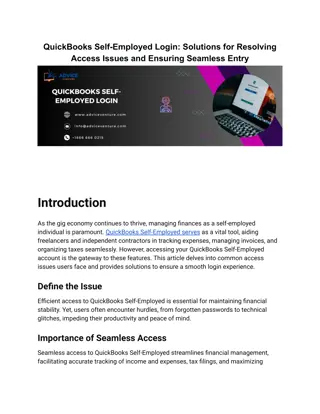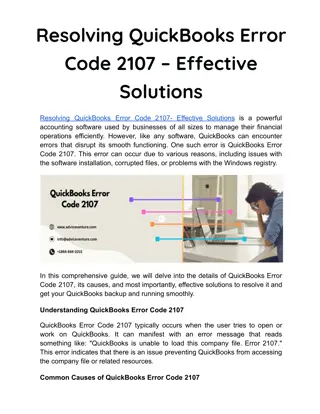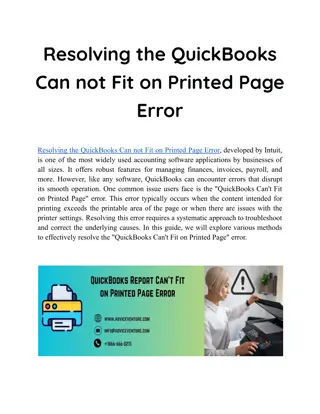Resolving Conflicts in Family Businesses: Insights and Strategies
Family businesses are common in India, but conflicts often arise due to differing opinions among family members. This article explores the characteristics of family businesses, common conflicts, and resolutions. Learn how lack of shared vision, succession issues, and power struggles impact family businesses, with a focus on the Ambani family conflict.
Download Presentation

Please find below an Image/Link to download the presentation.
The content on the website is provided AS IS for your information and personal use only. It may not be sold, licensed, or shared on other websites without obtaining consent from the author. Download presentation by click this link. If you encounter any issues during the download, it is possible that the publisher has removed the file from their server.
E N D
Presentation Transcript
CONFLICTS IN FAMILY BUSINESS AND THEIR RESOLUTION TORAN LAL VERMA DHSGU, SAGAR
Family Business Family business has been as common in the Indian economy like elsewhere in the world, it is perceived in a common sense. Various terms like family- owned, family controlled, family managed, business houses, and industrial houses are used to refer to family business. According to Berry Ownership control by the members of a single family. Rosenblatt, de Mik, Anderson, and Johnson. Majority ownership by a single family and direct involvement by at least two members in its operation.
R. G. Donnelley Family business is a firm which has been closely identified with at least two generations of a family and when this link has had a mutual influence on company policy and on the interests and objectives of the family. a business can be defined as a family business when its ownership and management are concentrated within a family unit.
Characteristics of family Business: 1. A group of people belonging to one or more families run one business enterprise. 2. Position in family business is influenced by the relationship the family members enjoy among themselves. 3. Family exercises control over business in the form of ownership or in the form of management of the firm where family members are employed on key positions. 4. Family exercises the influence on the firm s policy direction in the mutual interest of family and business. 5. The succession of family business goes to the next generation. 6. Family business in India is largely caste-related. 7. Every caste enjoys a dominant culture which gets duly reflected in their family businesses also.
Conflicts in family business Conflict is unavoidable in family businesses as it is an amalgam of individuals (family and non-family members) who are more likely to hold different opinions on a matter that result in disagreements on strategic or tactical issues. In fact, if there is no conflict, it reflects that people are not either thinking or trying to improve or have no power to assert.
Conflict in Ambani Family is widely discussed example of conflict in family businesses
Major conflicts in Family Business 1. Direction for the business: Lack of commonly shared vision and values often leads to disagreements among family members. If the business is not directed towards a set of shared strategic goals, conflicts are bound to arise. 2. Decision-making: Another major source of conflict is lack of clarity on the decision-making process and the authority over decisions that respective family members have. In addition, lack of a conflict resolution mechanism in cases of differences often crop up and spill over to the family business. 3. Roles and responsibilities: Lack of clarity on the roles and responsibilities of individual members and their understanding of the same are potential sources of conflict. Role-overlaps and poorly described performance expectations also become potential sources of conflicts. 4. Compensation/benefits: Remuneration and rewards are among the most frequent sources of conflict. If these are perceived to be unjust or inequitable, a solid ground for potential conflicts is generated, especially among next generation members.
5. Ownership: Family ownership of business is a major responsibility. The actual ownership of the stake and the terms of its transfer to the next generation need to be clearly documented and communicated to family members. Failure in doing so can result in conflicts. 6. Distributions to non-employee shareholders: Shareholders expect fair treatment and distribution of dividends and earnings. Inequitable distributions are invitations to conflicts. 7. Personality Differences: Family businesses that fail to acknowledge and accommodate differences in the personalities of individuals involved are more prone to conflict. Interpersonal businesses must devise forums for open communication where members can say what they need to say to others. 8. Accountability: Family members need to be accountable and perform as per expectations. Disciplining may be needed if resentments grow into confrontations.
9. Succession: Clear and mutually agreed decision regarding the successor is important to save family business from conflicts in leadership transition stage. Everyone must be taken into confidence regarding the transition process and time. 10.Sibling Rivalries: It is natural for siblings to vie for parents attention in childhood. However, if these rivalries continue even after growing up life stages and into the business, these can result into bitter conflicts. Parents need to treat children equally and help them resolve differences. 11.Communication: Unclear, infrequent, partial communication leads to gaps in understanding and create conflicts. Family businesses must devise forums for open communication where members can say what they need to say to others.
12.Finances: Money matters often become major sources of conflict among family members. These differences are compounded in cases where there is no or little distinction between individual and business funds. A financial management mechanism that takes care of needs of all family members must be devised in a way that does not over burden the business. 13.Estate Plans: Lack of clarity on the estate plan formulated by the senior generation raises anxiety among other members. If family members do not have a clear idea of what will be their share in the inheritance, conflicts are bound to arise.
Resolution of Conflicts in Family Businesses 1. Treating the company as a company, and the family as a family: Naming a business charge due to the place they occupy in the family tree, or belittling or overvaluing a family member due to their position in the company, is not only a mistake but also a source of conflicts that risk the survival of both the company and the family. The only rule for hiring and promotions should be the merits of each person for each position, regardless of whether or not they belong to the family or their place in the family tree. 2. Establish conflict resolution mechanisms: most successful family businesses have conflict resolution mechanisms in place and functioning - even when everyone seems to be happy and nothing points to a brewing conflict. having these types of mechanisms is important for any type of organization. But it is even more crucial in an environment where there are so many more emotions and sensitivities at play. The likelihood of conflicts appearing is much higher when there is more personal involvement.
3. Have structures in place: Due to the variety of sensitive issues and governance implications that arise in a family business, it is highly recommended to have governance and management structures for almost everything. On the family side, it is advisable to provide tools such as a Family Constitution and create governing structures such as a Family Council, a Family Assembly and/or a Family Office. Having these structures in place gives clarity to the scope of everyone s roles and responsibilities in the business, and helps improve governance and family cohesion. 4. Establish shared family values, goals, and objectives: The key to a harmonious working relationship with your family is to make sure that everyone understands what you re trying to achieve and how meeting that goal can benefit your family individually and as a business unit. It s also important to share the same family values with one another and that there s an attempt to stay away from misconduct that will not contribute to your goals.
5. Early and frequent Communication: Many large complications start as small problems that could have been resolved with early intervention. Sometimes, spotting issues early and addressing them through clear communication can be enough to prevent a conflict from developing. formal family meetings can be a better place to hash out complex issues that issues are not ignored and that members of the family have the opportunity to make their opinions heard. 6. Seeking the help of mediators: Some conflicts cannot be resolved among family members, so it might be best to bring in experts to help reach an agreement through a formal mediation process. Expert mediators have an objective view of the issue and can use their training to lead your family through initial talks until they reach a final resolution.
Weblinks https://cfeg.com/insights_research/understanding-conflict-in-the-family- business/#:~:text=A%20family%20conflict%20can%20impede,area%20of%2 0the%20family's%20life https://newsletters.isb.edu/FamilyBusiness- Newsletter/File/Article_Summary_03_Nov_2015.pdf http://www.uabsknowledge.ac.nz/en/business-review/family-business- issue/conflict-in-a-family-business.html https://www.intheblack.com/articles/2015/10/28/5-ways-to-manage-conflict- in-a-family-business https://guthriejensen.com/blog/5-steps-to-overcome-conflicts-in-family- business/ https://www.forbes.com/sites/iese/2019/12/27/five-rules-to-prevent-conflicts- in-family-businesses/#c26da8b66620























